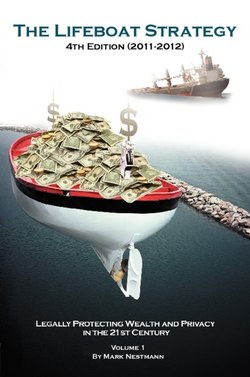Читать книгу THE LIFEBOAT STRATEGY - Mark Nestmann - Страница 31
На сайте Литреса книга снята с продажи.
National ID Cards Through the “Back Door”
ОглавлениеThe chief principle of a well-regulated police state is this: That each citizen shall be at all times and places … recognized as this or that particular person. No one must remain unknown to the police. This can be attained with certainty only in the following manner. Each one must carry a pass with him, signed by his immediate government official, in which his person is accurately described … No person should be received at any place who cannot thus make known by his pass his last place of residence and his name.
– Johann Gottlieb Fichte, 1796 (German philosopher and historian)
Imagine walking down the street to the corner store for a newspaper and being stopped by police. The police demand to see your identification. You aren’t carrying it with you. You’re immediately arrested and placed into custody.
Is this a totalitarian nightmare of East Germany or the Soviet Union? No, this is everyday life in dozens of countries that have already issued their citizens national ID cards that must be carried at all times. Failure to present the card upon demand is an offense in many of these countries.81
Once a system of universal identification is established, it’s a short step to requiring people to have and carry ID cards. And at least in the United States, that’s where an obscure law called the “Real ID Act”82 comes into play.
Enacted in 2005, the Real ID Act established “national uniform standards” for driver’s licenses. Once the law comes into effect in 2013, state driver’s licenses that fail to conform to federal “minimum standards” will no longer be valid for any federal “official purpose.” Examples of “official purposes” include boarding an airplane, buying a firearm, obtaining federal benefits, or even entering a federal courthouse.
From the outset, state governments hated the Real ID initiative. The reason had nothing to do with any concern about privacy, states’ rights, or any other constitutional concern, but a more immediate problem: money.
The Real ID Act is a classic unfunded mandate, foisted upon the states by the federal government. Estimates of implementing it nationwide run into the tens of billions of dollars. That’s chump change in comparison with the cost, say, of bailing out AIG. But for fiscally strapped states, it represents a big stack of mostly borrowed dollars.
Ironically, the REAL ID initiative will actually make us less secure, particularly against crimes like identity theft. Computer experts have easily duplicated virtually every state-of-the-art identification document that currently exists. There’s near-zero proof that high-tech drivers’ licenses will be any different.
But the real danger is the national database the Real ID Act authorizes. That database will include details on over 150 million licensed drivers. Each state must provide electronic access to all other states to information contained in its motor vehicle database. Experts say an interlinked system is a far greater security risk than a decentralized one with each state issuing ID cards according to its own rules.83
Proponents of national ID cards claim that they can be used for uses other than security: as a convenient way of receiving government benefits, for instance. This multiple use aspect of national ID cards illustrates a common process in privacy invasion: “surveillance creep.” A technology or law intended for one purpose, winds up being used for many others.
A classic example is the Social Security card. Once stamped “not for identification,” the number on your Social Security card is now required to file a tax return, open a bank account and to obtain a driver’s license. Will “smart” national ID cards be any different?
Another rationale governments use to justify national ID cards is to help crack down on black markets and the underground, tax-free economy. And with a national ID card that can also be used as a debit or credit card, governments could even eliminate a paper currency. It’s a short step from “debit/credit cards accepted here” to “Sorry, we only take debit/credit cards.”
